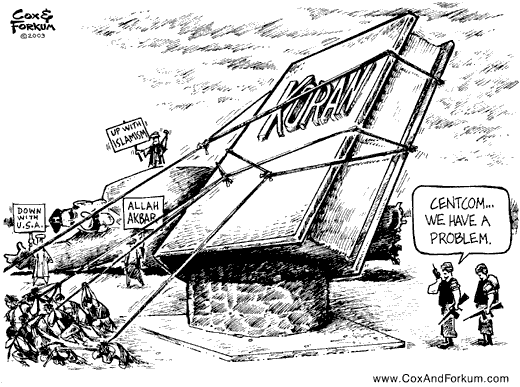Having been forced to recognize that our soldiers won a brilliant military victory in Iraq, media commentators are trying to minimize that achievement by loudly proclaiming how much more difficult it will be to “win the peace” by establishing a stable and benevolent new government in Iraq.
But the greatest threat to this goal is not the existing divisions and hatreds among different Iraqi factions. The problem is the advice these very same commentators are giving about how to deal with those divisions: that the key to the political reconstruction of Iraq is to ensure the right political balance of different ethnic and religious groups. The proper ratio of political jobs and positions of authority, we are told, must be handed out to Shiites, Christians, “Marsh Arabs,” Kurds, and every other minority faction in the country. This is supposed to be the only way to keep Iraq from collapsing into chaos and falling under the sway of a new strong-arm leader.

But merely “balancing” tribal and religious pressure groups will not solve the problem. Indeed, an approach that focuses primarily on representation quotas for Iraq’s minorities will merely encourage endless power struggles as each pressure group schemes for a bigger share of political patronage.
What Iraq needs is a much more radical reform: not the sharing of political power but the limiting of political power–a focus, not on the prerogatives of ethnic groups, but on the rights of the individual.
The greatest threat to good government in Iraq is precisely that each tribal and religious faction will demand special favors, that the Shiites in the south will want a Khomeini-style theocracy, or that the Kurds will make a grab for control of the northern oil fields. This kind of political gang warfare between opposing factions is inevitable–so long as the government has the power to dispense such privileges.
That is why it is crucial, for example, that the new Iraqi government enforce, not a balance of power between Sunnis and Shiites, but a separation of church and state. Religion must be made into a private matter, with Shiites, Sunnis, Christians, and secular Iraqis left free to follow their own individual judgment in spiritual matters. In the Middle East, where religious fanaticism is far more prevalent than in the West–and in Iraq, which has a history of conflict between Sunnis and Shiites–anything less than a complete separation of church and state is an invitation to civil war.
Just as Iraq must separate church and state, so it must also separate the state from economics. The most important step is to privatize Iraq’s oil industry.
The Bush administration has stated repeatedly that Iraq’s oil “belongs to the Iraqi people.” Yet state ownership of oil reserves has had a profoundly evil effect on every country in the Middle East.
In a free society, wealth is generated by the productive activities of millions of private individuals running private businesses. In such a system, most individuals support themselves through their own endeavors–which makes them independent of the state and gives them less incentive to resort to pressure-group tactics to grab a share of government largesse. Yet when the state takes control of vast oil reserves, the structure of a society is turned upside-down. When the government controls the nation’s largest source of wealth, individuals conclude that the road to prosperity is not through independent, private endeavor. Instead, they decide that the way to get ahead is to join together into political gangs to get their cut of the government’s loot.
Privatizing Iraq’s oil resources and production facilities would take that wealth out of the reach of a political spoils system and put it into the hands of individuals: the nation’s most capable businessmen, its most qualified professionals, and its savviest investors.
Why are our commentators so focused, instead, on a balance of ethnic representation? The intellectual and political trend of the last century has been to elevate “group rights” over individual rights. Our intellectuals tell us that we are only free if our particular race, class, and gender group has clout in the government. This approach has been pushing America on a slippery slope toward balkanization. The same advice will push Iraq over a precipice.
Only one oppressed minority desperately needs representation in Iraq’s new government: the individual. In the long run, it is only by protecting the liberty and independence of the individual–not by keeping Iraqis ganged together into warring clans–that “Operation Iraqi Freedom” can succeed.
Credit for the political cartoons in this article go to Cox and Forkum. If you enjoyed them, get their book Black and White World.–Editor
